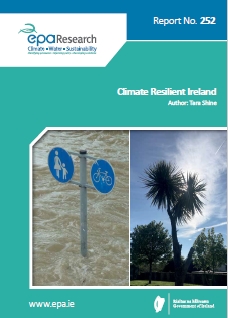Research 252: Climate Resilient Ireland
Author: Tara Shine
Summary: This study defines a common understanding of what constitutes a climate resilient Ireland, it examines climate resilient pathways which Ireland can take to transition to a low-carbon, climate resilient society and meet its goals as set out in the Climate Act 2015. Finally, it identifies eight factors which should inform the choice of those pathways.

Identifying Pressures
This study looks at Ireland’s preparedness for climate impacts in the context of the National Transition Objective, established by the Climate Action and Low Carbon Development Act 2015, to achieve a “low carbon, climate resilient and environmentally sustainable economy by the end of the year 2050”. The concept of resilience is unpacked and approaches to resilience from the EU and internationally are presented. An assessment is made of Ireland’s current resilience and capacity to adapt. There is an urgent need to capture the synergies between sustainable development and climate action to increase resilience given Ireland’s commitment to Agenda 2030, achieving the Sustainable Development Goals (SDGs) and implementation of the Paris Agreement.
Informing Policy
A climate resilient Ireland can be achieved and this report proposes how. A climate resilient Ireland is a pathway to sustainable development, i.e. climate resilient pathways are being actively pursued that reduce climate change and its impacts, manage risk and promote sustainable development. A narrow focus on climate change adaptation will not be adequate to deliver a climate resilient Ireland. An effective approach should be informed by sustainable development, coherence (e.g. with mitigation), urgency, transformation, making every investment count, capturing the co-benefits, learning by doing and fairness.
Further work is needed to strengthen adaptive capacity, including national vulnerability and climate risk assessments, costing, prioritising and creating an inventory of adaptation actions, capacity building and the full deployment of Climate Ireland.
Developing Solutions
Ireland is at the beginning of the transition to a low-carbon, climate resilient society. Although the transition needs to be carefully managed to be fair and effective, the opportunities it provides are innumerable if the co-benefits are captured.
To achieve climate resilience, a 2050 vision for a sustainable Ireland should be developed that articulates economic, social and environmental goals and engages all stakeholders to achieve a prosperous, safe, sustainable and equitable Ireland for present and future generations. Working back from 2050, shorter term plans will be needed to achieve the vision and these will not be confined to adaptation and mitigation plans; instead, they require a comprehensive and far-reaching refresh of national policymaking.
https://www.epa.ie/media/epa-2020/publications/research/Research_252_thumbnail[1].jpg